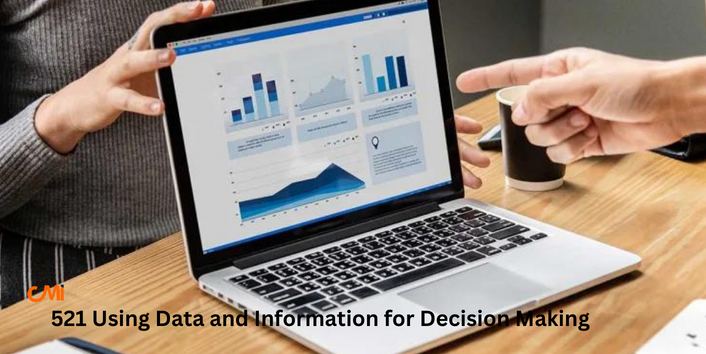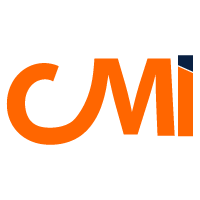CMI 521 Using Data and Information for Decision Making
- February 16, 2023
- Posted by: Scarlett
- Category: CMI Level 5

Table of Contents
CMI 521 Using Data and Information for Decision Making is a course focusing on utilising data and information to make informed decisions in today’s rapidly changing business environment. The course is designed to equip individuals with the necessary knowledge and skills to collect, analyse, and interpret data to facilitate effective decision-making processes. It is an integral part of the Chartered Management Institute (CMI) curriculum, which provides professionals with the tools and techniques to succeed in their respective fields.
The course covers various topics, including data visualisation, statistical analysis, data-driven decision-making, and data ethics. Participants are expected to understand the multiple types of data, data sources, and data analysis techniques and their implications in making informed decisions. The course also emphasises the importance of using data to measure an organisation’s performance and identify areas for improvement.
Overall, CMI 521 Using Data and Information for Decision Making provides participants with the necessary skills to collect and analyse data, which is crucial in decision-making. The course is designed to equip individuals with the necessary knowledge and skills to make informed decisions that will positively impact their organisations.
Aims of unit
The ability to analyse and manage data and information is becoming increasingly vital for organisations to maintain their competitiveness, drive innovation, boost productivity, and enhance customer satisfaction. However, as the volume of data and information increases at an unprecedented rate, organisations face challenges in interpreting, utilising, and harnessing ‘big data’.
This unit aims to equip learners with the knowledge and skills necessary to address these challenges. It aims to provide learners with a comprehensive understanding of the purpose and practices of interpreting, managing, and presenting business data and information, which can be used to inform decision-making. Through this unit, learners will understand how to use data and information effectively, including how to analyse and interpret it and use it to make informed decisions that drive success.
By developing these skills, learners will be better equipped to manage and utilise the increasing volume of available data and information, which will help them become more competitive, innovative, and productive. Ultimately, this unit will help learners to understand how to use data and information as strategic assets to drive success in their organisations.
What you’ll learn
In CMI 521 Using Data and Information for Decision Making, learners will gain a wide range of knowledge and skills related to data and information management. Some of the key topics covered in the course include:
- Understanding the role of data and information in decision-making: Learners will understand how data and information can be used to support decision-making processes, including data analysis, interpretation, and presentation.
- Identifying and collecting relevant data: Learners will develop skills in identifying and collecting relevant data, including using different data sources, the importance of data quality, and the ethical considerations associated with data collection.
- Analysing and interpreting data: Learners will develop skills in analysing and interpreting data, including statistical methods and data visualisation techniques.
- Managing and presenting data: Learners will gain an understanding of best practices in managing and presenting data, including the use of data management systems and data presentation tools.
- Using data and information to inform decision-making: Learners will learn how to use data and information to support decision-making processes, including identifying key performance indicators and using data-driven decision-making techniques.
Overall, the course is designed to provide learners with a comprehensive understanding of the role of data and information in decision-making and the knowledge and skills necessary to effectively manage, analyse, and present data to support decision-making processes in organisations.
What are the possible outcomes?
The outcomes of studying CMI 521 are numerous and can include the following:
- Understand the use of data and information in decision making
- Be able to interpret data and information to support decision making
- Know how to present data and information used for decision making
How can we help?
CMI 521 Using Data and Information for Decision Making is a challenging course that requires learners to demonstrate a comprehensive understanding of data and information management. Completing assignments for this course can be time-consuming and complex, so learners may need support to produce high-quality work. CMI Assignment Help is a service that can assist learners with their CMI 521 assignments and help them achieve their desired grades.
CMI Assignment Help provides learners access to experienced tutors with in-depth knowledge of the course content and assessment requirements. These tutors can assist learners with their assignments, guiding the content, structure, and referencing criteria. They can also help learners understand complex concepts and theories related to data and information management, providing personalised support to help them achieve their goals.
In addition, CMI Assignment Help provides learners with access to a range of resources and tools to help them complete their assignments. These resources include examples of previous assignments, templates, and academic resources, such as research databases, to ensure learners have access to the necessary information to complete their assignments to a high standard.
CMI Assignment Help is an excellent resource for learners who need support completing their CMI 521 assignments. The service provides personalised support, access to experienced tutors, and a range of resources and tools to help learners achieve their desired grades. Using this service, learners can ensure they produce high-quality work demonstrating their understanding of the course content and assessment requirements.
Resources
- Ackoff (1989) Data, Information, Knowledge, Wisdom (DIKW) Model
- Collison and Parcell (2004) Knowledge Management
- Nonaka and Takeuchi (1995) Socialisation, Externalisation, Combination, Internalisation (SECI) Model
- Edwards (2009) People, Process, Technology
- Drucker (1959) The Knowledge Worker
- Vroom Yetton (1973) Decision Model
- Kepner Tregoe (1965) Rational Decision Making
- Boyd (date) OODA Loops
Related Articles:
FAQ
What is CMI 521, and what does it cover?
CMI 521 is a course focused on using data and information for effective decision-making in various business contexts. The course explores techniques, tools, and methodologies for collecting, analyzing, and interpreting data to support decision-making processes. It addresses the role of data in driving business strategies and optimizing organizational performance.
How does data-driven decision-making benefit organizations?
Data-driven decision-making empowers organizations to make informed choices based on evidence and insights derived from data analysis. By relying on data, organizations can reduce guesswork, identify patterns, trends, and correlations, and mitigate risks. Data-driven decision-making also improves efficiency, enhances customer experiences, and fosters a culture of innovation and continuous improvement.
What types of data are commonly used in decision-making processes?
Decision-making processes involve various types of data, including quantitative data (numerical measurements), qualitative data (descriptive or subjective information), structured data (organized in a predefined format), and unstructured data (not organized in a predefined manner). Additionally, organizations may utilize primary data (collected firsthand) or secondary data (collected by others).
Which data analysis techniques are covered in CMI 521?
CMI 521 typically covers a range of data analysis techniques, including descriptive statistics (mean, median, standard deviation), inferential statistics (hypothesis testing, regression analysis), data visualization (charts, graphs), data mining, and predictive modeling. The course may also delve into advanced analytics concepts like machine learning and artificial intelligence for decision-making.
How can organizations ensure data quality and integrity for decision-making purposes?
Maintaining data quality and integrity is essential for making accurate decisions. Some best practices include establishing data governance policies, conducting regular data audits, ensuring data accuracy through validation processes, and implementing security measures to protect against data breaches. Additionally, employing data quality tools and involving stakeholders in data quality assurance can contribute to better decision-making outcomes.
Why Choose Us?
- GPT Zero
- 100% Non-plagiarised Papers
- Dedicated human resource writers
- 24/7 /365 Service Available
- Affordable Prices
- Money-back and Privacy guarantees
- Unlimited Amendments upon request
- Satisfaction guarantee
